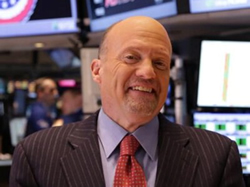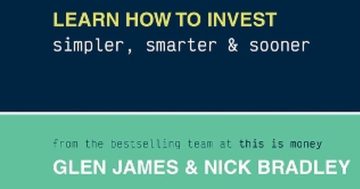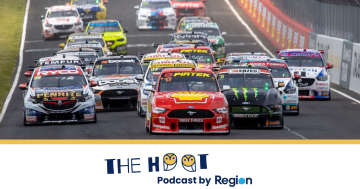Scott Rutt* finds that neither age nor wealth should prevent anyone from having at least a little money stored away in the stock market.
 No matter how old or wealthy you are, you should have some money socked away in the stock market, Jim Cramer (pictured) told his Mad Money viewers.
No matter how old or wealthy you are, you should have some money socked away in the stock market, Jim Cramer (pictured) told his Mad Money viewers.
Mr Cramer said the stock market was still the best ladder we have for social mobility.
Anyone who invests a decent chunk of their salary every year will be rewarded over the long term, bear markets and all.
In fact, from 1928 through 2014, the S&P 500 index averaged a 10 per cent annual return, including dividends.
That may not seem like a lot, but 10 per cent will double your money every seven years thanks to the wonders of compound interest.
Or, put another way, if you invest $10,000 today, 40 years from now that investment could be worth $450,000.
That’s why even a little money passively saved in the stock market can yield big rewards later in life.
Not all investments are created equal, Mr Cramer told viewers.
Every investor should have two piles of cash, one dedicated to retirement and another to a discretionary or ‘mad money’ stock portfolio.
Retirement should always come first and is invested conservatively, while the mad money portfolio can afford more risks.
How should investors get started?
Mr Cramer said your first $10,000 should be invested in an index fund or exchange-traded fund that mirrors the S&P 500.
Once that goal is achieved, and you’ve maxed out your retirement accounts, you can then expand your investments to include at least five diversified stocks for your discretionary portfolio.
Use your youth to take risks and to speculate, Mr Cramer said.
Your long-time horizon will allow you to make up for losses.
Back in 2005, he recommended Regeneron, a development-stage biotech, at $5 a share.
By 2015, just 10 years later, Regeneron topped $592 a share for a 9,900 per cent gain.
Gains like that, he said, cannot be had without rolling the dice a few times when you’re young.
Do bonds have a place in your investment portfolio? That depends on your age, Mr Cramer told viewers.
It’s no secret that interest rates have been historically low since the Great Recession, but that doesn’t mean you should count bonds out altogether.
Stocks are for capital appreciation, he said, while bonds continue to excel at capital preservation.
You’ll never get rich owning bonds, but they are the closest thing to a risk-free investment you will find.
As for when to own them, Mr Cramer said no one under the age of 30 should own bonds.
In your 30s, however, he advised up to 10 per cent of your portfolio could be invested in bonds.
By your 40s, that number can increase to between 20 per cent and 30 per cent.
In your 50s, between 30 per cent and 40 per cent, which is appropriate for your pending retirement.
Mr Cramer’s final lesson for investors is that there’s no such thing as ‘buy and hold’, especially over the long term.
He said ‘buy and do your homework’ is the mantra investors should be reciting because every investment needs to be checked up on periodically.
When the markets are in decline, when the panic is setting in, that’s the time when homework really shines.
Mr Cramer said if you’ve done your homework, you’ll know exactly what to buy when the markets are putting everything on sale.
He noted that when the markets dip by 10 per cent, that’s usually a good entry point to start picking among the rubble.
If you’re investing for the long term you’ll be able to discriminate between the stocks in the blast radius that are taking the markets lower, and those that are only receiving collateral damage.
Buying on the dips is only possible, however, if you take profits when the market rallies so you’ll have some cash on the sidelines ready to buy on weakness.
*Scott Rutt has been covering Jim Cramer and Mad Money for The Street since 2006, providing a nightly recap of the show.
This article first appeared at www.thestreet.com.











